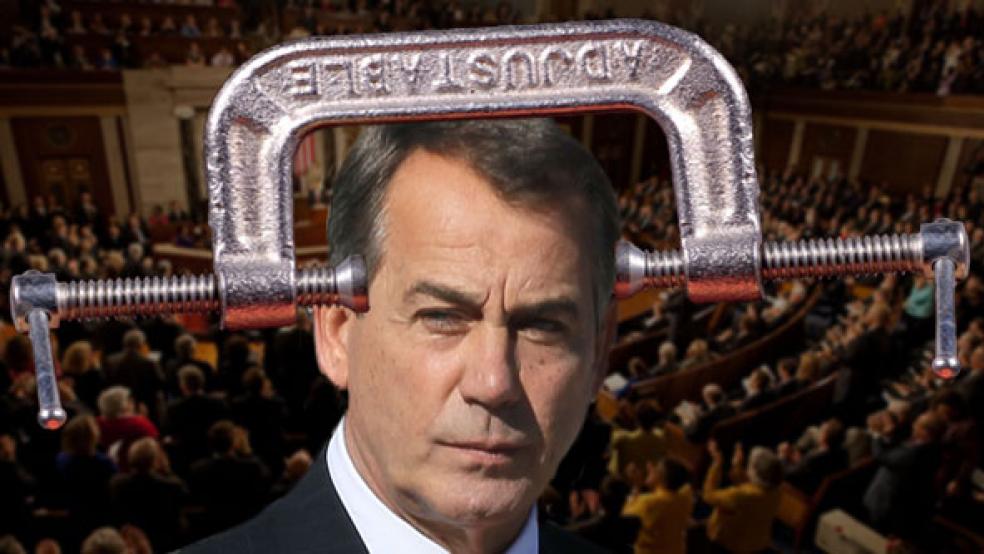President Obama's senior advisors just announced that Speaker John Boehner's debt ceiling bill was dead on arrival: if it did make its way through Congress and to the President, they would recommend he veto it. But Obama isn’t the only thorn in Boehner’s side amid the ongoing debt ceiling drama; it’s the growing conservative revolt within his own party.
Republican Study Committee Chairman, Jim Jordan of Ohio said that as of this morning he was “confident there were not 218 Republicans in support of the [Boehner’s] plan,” he told reporters Tuesday.
Jordan says he and other conservatives don’t support Boehner’s deficit reduction package because it doesn’t cut enough spending from the federal budget and it doesn’t require a balanced budget amendment. He also expressed concern with Boehner’s plan to create a bipartisan 12 member House-Senate commission that would then be instructed to come up with an additional $1.8 trillion of deficit savings over 10 years by late this year. The RSC is comprised of 178 conservatives out of the 240 Republican House members.
Boehner, R-OH, unveiled his two-step approach Monday afternoon which would immediately raise the debt ceiling by up to $ 1 trillion---just enough to get the Treasury through the remainder of this year – and cut discretionary spending by $1.2 trillion over the coming decade. “It’s reasonable, it’s responsible, it can pass the House and it can pass the Senate,” Boehner said at a press conference Tuesday.
Meanwhile, House Minority Whip, Steny Hoyer, D-MD., told reporters on Tuesday “very few” Democrats in the House would support Boehner’s plan. At the same time, he said there would be broad support for Senate Majority Leader Harry Reid’s, D-N.V., dueling proposal to cut spending by $2.7 trillion and raise the debt ceiling through 2012.
GOP Presidential hopeful Rep. Michele Bachmann, R-Minn., also opposes Boehner’s plan. She and a handful of other members in the House oppose any increase in the debt ceiling because they believe “there needs to be a fundamental restructuring in how Washington spends taxpayer dollars,” said Becky Rogness, spokesperson for Bachmann.
Congress has seven days to raise the government’s federal borrowing authority which stands at $14.3 trillion. After that point, officials say the government will run out of money to pay its bills and possibly default for the first time in history. A default could devastate the economy and trigger a serious spillover effect to world markets. House Republicans and the President and Democrats still appear oceans apart on finding an agreement on a deficit reduction plan.
Jordan was joined by 15 other House and Senate Republicans who favor legislation to prioritize government payments in the event that the debt limit is not raised by August 2. The bill, “Ensuring the Full Faith and Credit of the U.S. and Protecting America’s Senior and Soldiers Act”, would pay off interest on the U.S. debt first, followed by Social Security payments and active-duty military pay.
“At this late stage in the process, it’s obvious now to everybody, that it is possible, increasingly possible, that we will not have raised the debt ceiling by August 2,” said Sen. Pat Toomey, of Pennsylvania.
Based on an analysis by the Bipartisan Policy Center, the group said they would be able to pay $29 billion in interest payments, $49.2 billion for Social Security checks and $2.9 billion for active-duty military members through the end of August. They said their plan was not a substitute for raising the debt ceiling, but a mechanism for minimizing the disruption if Congress fails to raise the debt ceiling by August 2.
When asked why these three obligations are more important than other payments, Toomey said it would be “imprudent” to default on the debt and is critical to pay off the interest. “Social Security is simply a very vitally important program to millions of American seniors and I think all of us feel a special obligation to the men and women who are literally risking their lives in live fire, fighting wars underway right now,” Toomey said.
The Bipartisan Policy Center’s analysis found the federal government has an estimated $306.7 billion in payment obligations for August 2011 after the 2nd of the month. The U.S. will take in $172.4 billion in revenue from August 3 to 31, 2011.
Toomey, Jordan and others support the Cut, Cap and Balance proposal which included a controversial Balanced Budget Amendment. It passed the House chamber last week but failed in the Senate.
Boehner’s office did not comment on the idea of making changes to his proposal to accommodate the conservatives one day before the plan is scheduled to come to the House floor.





